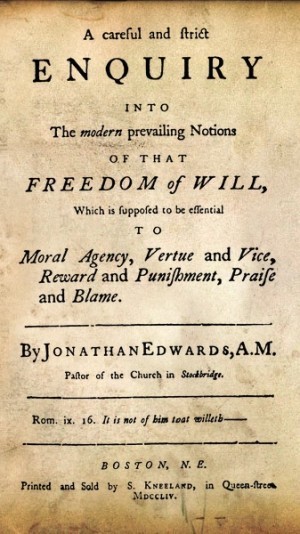Justin Taylor's Blog, page 148
July 19, 2013
Free Study Guides for Understanding Jonathan Edwards’ “Freedom of the Will”
 Princeton’s professor of ethics Paul Ramsey—who in 1957 edited the critical edition of Jonathan Edwards’ Freedom of the Will as the first volume in Yale’s Works of Jonathan Edwards—wrote in his introduction that “This book alone is sufficient to establish its author as the greatest philosopher-theologian yet to grace the American scene.”
Princeton’s professor of ethics Paul Ramsey—who in 1957 edited the critical edition of Jonathan Edwards’ Freedom of the Will as the first volume in Yale’s Works of Jonathan Edwards—wrote in his introduction that “This book alone is sufficient to establish its author as the greatest philosopher-theologian yet to grace the American scene.”
John Piper says it is “probably the greatest defense and explanation of the Augustinian-Reformed view of the will which exists today. . . . It is simply without peer. We would live in a different world of evangelicalism if Christians would read it.”
But few have read it today.
The original title—in a day when long titles also functioned as a summary of the book—was: A Careful and Strict Inquiry into the Modern Prevailing Notions of that Freedom of the Will, which Is Supposed to Be Essential to Moral Agency, Virtue and Vice, Reward and Punishment, Praise and Blame.
Edwards worked out his thinking on the subject over many years, but began actually drafting the book in August of 1752 while in Stockbridge. It was ready for publication in 1753 and eventually published in 1754.
I’m please to make available a few resources here that may be helpful for those who want some help in accessing this influential argument.First is a study guide from Doug Sweeney, an accomplished Edwards scholar who is professor of church history at Trinity Evangelical Divinity School. Sweeney’s handouts provide an overview of some historical-contextual benchmarks, some questions to ask of the text, and a brief summary of the argument.
Second is an essay entitled “The Will: Fettered but Free,” by Sam Storms, who wrote his doctoral dissertation on Edwards’ doctrine of original sin. This chapter originally appeared in A God-entranced Vision of All Things: The Legacy of Jonathan Edwards, edited John Piper and Justin Taylor (Crossway, 2004), 201-220, posted with the permission of Crossway.
Storms lays out an overview of his essay:
First, I will briefly unpack Edwards’ devastating critique of libertarianism, one that I am convinced has yet to be successfully refuted.
Second, I will reconstruct Edwards’ concept of the will. Although some have found it to be intolerably complex, it is actually quite simple and forthright once one grasps the meaning of several important terms he employs.
Third, and finally, I want to address the most problematic element in Edwards’ theology of the will, the fall of Adam and the entrance of evil into the human race.
Storms expresses some disagreement with Edwards’ approach on how the fall came about. On this, see also Peter Beck, “The Fall of Man and the Failure of Jonathan Edwards.”
Finally, and perhaps most helpfully for those who want help in tracing the full argument, Daniel P. Fuller has given me permission to post his section-by-section digest of Freedom of the Will. He is using an older edition of the work, but it should still be relatively easy to follow and is a wonderful example of how to summarize a book and come to terms with an author and his argument.
May the Lord bless each of you who decide to study this profound and influential work!
July 18, 2013
Why Christian Growth Often Begins Strong but Then Goes So Slow
Archibald Alexander (1772-1851), who founded Princeton Seminary, writes:
It seems desirable to ascertain, as precisely as we can, the reasons why Christians commonly are of so diminutive a stature and of such feeble strength in their religion.
When persons are truly converted they always are sincerely desirous to make rapid progress in piety; and there are not wanting exceeding great and gracious promises of aid to encourage them to go forward with alacrity. Why then is so little advancement made? Are there not some practical mistakes very commonly entertained, which are the cause of this slowness of growth?
I think there are, and will endeavour to specify some of them.
And first, there is a defect in our belief of the freeness of divine grace.
To exercise unshaken confidence in the doctrine of gratuitous pardon is one of the most difficult things in the world; and to preach this doctrine fully without verging towards antinomianism is no easy task, and is therefore seldom done. But Christians cannot but be lean and feeble when deprived of the proper nutriment. It is by faith, that the spiritual life is made to grow; and the doctrine of free grace, without any mixture of human merit, is the only true object of faith.
Christians are too much inclined to depend on themselves, and not to derive their life entirely from Christ. There is a spurious legal religion, which may flourish without the practical belief in the absolute freeness of divine grace, but it possesses none of the characteristics of the Christian’s life. . . . Even when the true doctrine is acknowledged, in theory, often it is not practically felt and acted on. The new convert lives upon his frames, rather than on Christ; and the older Christian still is found struggling in his own strength . . . and then he sinks into a gloomy despondency. . . .
Here, I am persuaded, is the root of the evil; and until religious teachers inculcate clearly, fully, and practically, the grace of God as manifested in the gospel, we shall have no vigorous growth of piety among professing Christians.
—Archibald Alexander, Thoughts on Religious Experience (Philadelphia: Presbyterian Board of Publication, 1844), 201-212
HT: Dane Ortlund
July 17, 2013
All the Known Audio of C.S. Lewis Speaking
Although Lewis died only 50 years ago, and was famous enough to appear on the cover of Time Magazine (
Dan Brown: “The Less His Talent, the More Amazing His Achievement”
 The opening of Clive James’ delightful take-down review in Prospect of Dan Brown’s latest tome:
The opening of Clive James’ delightful take-down review in Prospect of Dan Brown’s latest tome:
As a believer in the enjoyably awful, I would recommend this book wholeheartedly if I could. But it is mainly just awful. Nevertheless it is still almost worth reading. In the publishing world they have a term, “pull line,” which means the few words of apparent praise that you can sometimes pull out of a review however hostile. Let me supply that pull line straight away, ready furnished with quotation marks: “The author of The Da Vinci Code has done it again.”
Once again, that is, he makes you want to turn the pages even though every page you turn demonstrates abundantly his complete lack of talent as a writer.
You can read the whole thing here.
Also see, “Don’t Make Fun of Renowned Dan Brown,” where Michael Brown writes in the Telegraph, “The snobs and critics will have a field day with the US author’s latest work—but I’m not joining in.” But do read the whole thing.
HT: @JohnStarke
An Interview with Bret Lott on Being a Writer and Being a Christian
I recently had the chance to sit down with bestselling novelist Bret Lott, whose new book Letters and Life: On Being a Writer, On Being a Christian has just been published by Crossway. We talk about when he began writing, how he knew he was good at it, what makes for good writing, and other related topics.
See also Lott’s post for those who are thinking about being a writer.
You can sample some of the book through this PDF or flip through it below:
Searching for Information on the Internet Is Easy; Pursuing Understanding Is Hard
Facts are cheap. We have access to nearly every piece of data we could possibly want through the Internet. The value of information as a raw material has dropped precipitously, with the exception of some time-sensitive subjects, like finance and the news, where speed still commands a price. But for most of us, the only cost of accessing information is the constant and inescapable presence of advertising.
What we need is the ability to bring those facts together into a compelling narrative. The synthetic act of understanding, of seeing how pieces of information work together and make a meaningful whole, is a skill that no amount of Googling can ever teach us.
Understanding and is the currency of our increasingly fragmented world; demand for the ability to gain and convey understanding has skyrocketed as the amount of accessible information has increased.
Understanding requires intimacy with a subject. It is the fruit of a sympathetic attentiveness, a willingness to consider carefully what is before us with the peculiar desire to learn more about it—rather than (necessarily) determine whether what you think about it is true. Understanding also comes in degrees—one person may understand astrophysics more than another, but both people would certainly understand more than I do. And sometimes the fullness of understanding requires living inside a subject and seeing it from within. We might understand how baseball works on the surface: three strikes makes an out, three outs in an inning, and base runners advance a base on a balk. But the game’s texture and dynamics often remain opaque to us who have never had first-hand familiarity with the players and clubhouse. We do not see how the game really works, how all the moving parts work together, and how the “intangibles” play out on the field.
Searching for information on the Internet is easy; pursuing understanding is hard. The former meets a felt need quickly and without effort. But the latter enables us to live well and flows from our living well. Google may solve a gap in our information, but the question of how we shall live, of what sort of friends we should seek, whether we should give our money to a charity in Africa or to the homeless man on the street—those are questions that will seize our attention when we place ourselves in environments where they arise. If we never encounter poverty, we may struggle to seriously wrestle with how we should use our resources. To know how we must respond, we must understand ourselves and the world, see how they work, and discern the peculiar shape of life to which we have been called. All the reading or browsing in the world is insufficient to give us wisdom without reading and questioning ourselves along with it.
Compared to the easy answers to surface questions, the long, tumultuous, and frequently painful work of seeking understanding seems really hard and generally useless. I understand why my students kicked against my methods and occasionally complained that I was being “mean.” Their habits of mind have been trained in a very different direction, as have all of ours. But questioning well means more than “finding an answer” so that we can simply get on with our lives. Those who inquire well must move from answers to understanding, from the instant gratification of our need for comfort and security toward the deepened desire for the enduring good of wisdom.
—Matthew Lee Anderson, The End of Our Exploring: A Book about Questioning and the Confidence of Faith (Moody, 2013), 71-72.
July 16, 2013
“In 20 Years, We’re All Going To Realize This Apple Ad Is Nuts”
Mark Wilson, writing at Fast Company’s Co.Design:
In what should be a warm, humanizing montage, people are constantly directing their attention away from one another and the real, panoramic world to soak in pixels. They’re choosing the experience of their products over the experience of other people several times in quick succession. And Apple has a warm voice in the background, goading us on.
This is a crazy world. Please tell me you see it, too.
He goes on:
My fundamental problem with the ad—why it’s begun to make my shoulders tense and stomach churn every time it comes on TV—is not that it’s lying about how we use technology, but Apple’s consecrating the behavior, and even going on to say that their products, not the lives they serve, are “what matters.”
You can read the whole thing here.
The only thing I disagree with his the title of the blog post. I’m not as optimistic that we’ll look back on this ad and recoil at the message. I fear we won’t even be asking the question.
And it presses home to me a more personal question: I can critique the ad, but are there times I am living in such a way to reinforce its message and ethos?
HT: @TedCockle
C.S. Lewis on How Technology Can Be an Idolatry
C. S. Lewis:
There is something which unites magic and applied science [=technology] while separating both from the “wisdom” of earlier ages.
For the wise men of old the cardinal problem had been how to conform the soul to reality, and the solution had been knowledge, self-discipline, and virtue.
For magic and applied science alike the problem is how to subdue reality to the wishes of men; the solution is a technique.
—The Abolition of Man (reprint: New York: HarperOne, 2001), p. 77; my emphasis.
Packer: Too Many Churches in North America Are Playing the Number Game
I have found that churches, pastors, seminaries, and parachurch agencies throughout North America are mostly playing the numbers game—that is, defining success in terms of numbers of heads counted or added to those that were there before. Church-growth theorists, evangelists, pastors, missionaries, news reporters, and others all speak as if
(1) numerical increase is what matters most;
(2) numerical increase will surely come if our techniques and procedures are right;
(3) numerical increase validates ministries as nothing else does;
(4) numerical increase must be everyone’s main goal.
I detect four unhappy consequences of this.
First, big and growing churches are viewed as far more significant than others.
Second, parachurch specialists who pull in large numbers are venerated, while hard-working pastors are treated as near-nonentities.
Third, lively laymen and clergy too are constantly being creamed off from the churches to run parachurch ministries, in which, just because they specialize on a relatively narrow front, quicker and more striking results can be expected.
Fourth, many ministers of not-so-bouncy temperament and not-so-flashy gifts return to secular employment in disillusionment and bitterness, concluding that the pastoral life of steady service is a game not worth playing.
In all of this I seem to see a great deal of unmortified pride, either massaged, indulged, and gratified, or wounded, nursed, and mollycoddled. Where quantifiable success is god, pride always grows strong and spreads through the soul as cancer sometimes gallops through the body.
Shrinking spiritual stature and growing moral weakness thence result, and in pastoral leaders, especially those who have become sure they are succeeding, the various forms of abuse and exploitation that follow can be horrific.
Orienting all Christian action to visible success as its goal, a move which to many moderns seems supremely sensible and businesslike, is thus more a weakness in the church than its strength; it is a seedbed both of unspiritual vainglory for the self-rated succeeders and of unspiritual despair for the self-rated failures, and a source of shallowness and superficiality all round.
The way of health and humility is for us to admit to ourselves that in the final analysis we do not and cannot know the measure of our success the way God sees it. Wisdom says: leave success ratings to God, and live your Christianity as a religion of faithfulness rather than an idolatry of achievement.
Packer says that he would like to see Kent and Barbara Hughes’ book, Liberating Ministry from the Success Syndrome, “made required reading for every pastoral aspirant.”
—J. I. Packer, A Passion for Faithfulness: Wisdom from the Book of Nehemiah (Wheaton: Crossway, 1995), 207-209.
None of this is in contradiction, so far as I can tell, between Matt Chandler’s arguments below about the relationship between faithfulness and fruitfulness. But it’s a warning from a seasoned sage that all of us, no matter which side of the horse we tend to fall off of, would be wise to hear.
July 15, 2013
The Central Tragedy of the Trayvon Martin Case Remains
 Al Mohler pens a poignant piece, which begins this way:
Al Mohler pens a poignant piece, which begins this way:
As the father of a young man, I know the talks parents have with their sons-or should have. I have had plenty of those talks, and I know them from both sides. But there is one talk I never had to have with my son, and my father never had to have with me. That is the talk about what to do when the police pull you over and you are a young black man. The talk about what to do when you are eyed suspiciously by people just because you are a young black male. The talk about how to act and how to respond when people watch just to see if you are trouble.
America is divided once again in the aftermath of the verdict in the George Zimmerman trial. The decision of the Florida jury to acquit Zimmerman on charges of murder and manslaughter in the killing of 17-year-old Trayvon Martin has reverberated around the world. Americans are divided along some very tragic and recognizable lines in the wake of the verdict. But the line that I find most important is this—the line between those parents who have to have that talk with their boys and those who do not.
Mohler concludes:
The central tragedy remains. A smiling 17-year-old boy who had gone to a convenience store to buy a soft drink and a snack was shot to death, and we will never know exactly how or why. We just know that it is an unspeakable tragedy. It is a moral tragedy that even the best system of justice cannot remedy, much less restore. It is a political tragedy, a cultural tragedy, and a legal mess. But far more than these, it is the tragedy of a boy now dead, of parents and loved ones grieving, and of a nation further wounded, confused, and tormented by the color line.
I think of the young black men on the campus I am honored to lead. I think of the faithful black parents whose families I so know, love, admire. I think of what they have to worry about that I never have to think about. I think of the conversations that must come for our nation and for our churches.
But most of all I am thinking of those parents who have to have that talk I never had to have with my son. I pray and yearn for that day when those conversations will not be necessary. May God watch over every single one of them, for they, starting with Trayvon Martin, belong to all of us.
You can read the whole thing here.
See also pieces by Thabiti Anyabwile, “A Personal Take in the Aftermath of Trayvon Martin and the Zimmerman Verdict” and Trillia Newbell, “Not Guilty: Now What?”
I also think Will Saletan, “You Are Not Trayvon Martin” and Ta-Nehisi Coates, “On the Killing of Trayvon Martin by George Zimmerman,” are worth reading.
Justin Taylor's Blog
- Justin Taylor's profile
- 44 followers





